IN FOCUS: A double whammy of subsidy removals and weakening ringgit is worsening costs of living for Malaysians
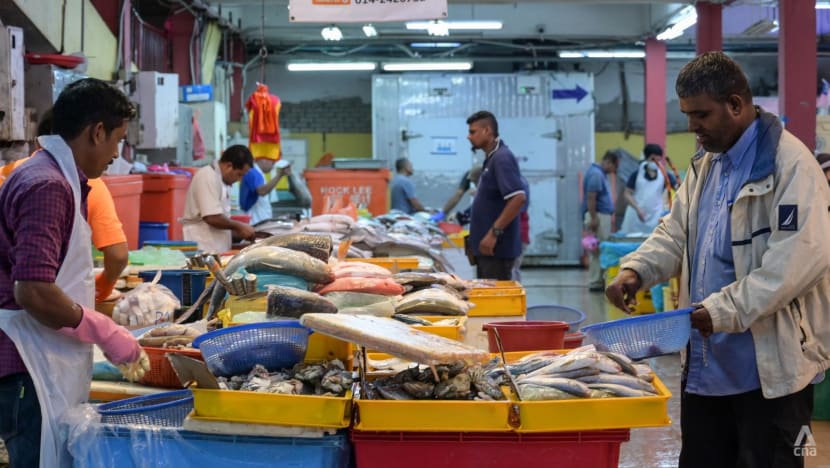
Both producers and consumers across Malaysia have been hit hard by the cost of living crisis. (Photo: CNA/Fadza Ishak)
This audio is AI-generated.
- Residents across Malaysia have been hit by food inflation and a depreciating ringgit
- There are concerns that the government's shift away from blanket to targeted subsidies could exacerbate the situation
- Analysts say moving away from populist policies like subsidy schemes could cost Prime Minister Anwar Ibrahim politically
KUALA LUMPUR/JOHOR BAHRU: At the Larkin wet market in Johor Bahru, poultry seller Hasri Muhammad Nasir swung his cleaver, and with deft strokes, cut an entire chicken into eight pieces.
Over the hubbub of the bustling market, he packed the chicken pieces into a bag and handed them over to an elderly lady. The price for the purchase was RM20.70 but Mr Hasri put out two fingers in his blood-stained glove.
“Just RM20 is fine, Mak Cik,” said the 35-year-old, with a smile, as the woman nodded and thanked him.
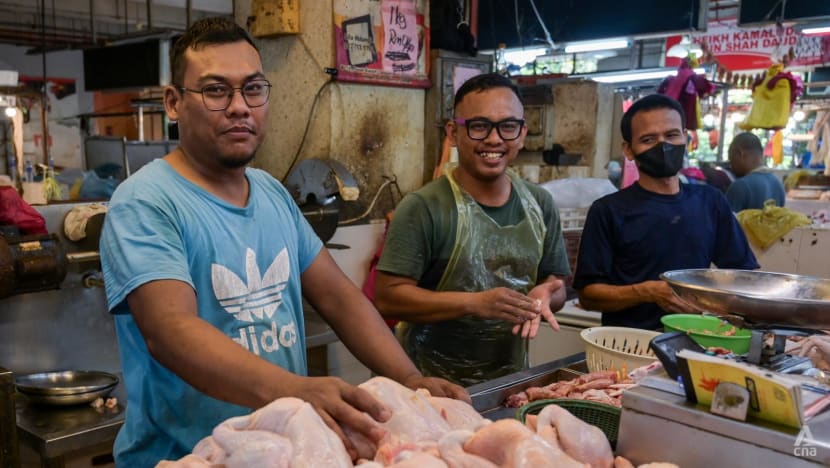
Mr Hasri told CNA later that “in these tough times, we have to give and take”.
“We also understand the issues faced by many Malaysians, we have to empathise and all help each other. But on the other hand, we also need to ensure we are not burdening ourselves and our own rice bowls,” he added.
Mr Hasri was referring to Malaysia’s recent move to lift price controls on chickens from Nov 1 in an effort to ease government expenditure on subsidies.
In his Budget speech last month, Prime Minister Anwar Ibrahim said the government has spent RM3.8 billion (US$820 million) on chicken and egg subsidies since February 2022.
“The original intent of the temporary subsidies was to control the prices of chicken and eggs that surged, as well as to overcome shortages,” said Mr Anwar.
“Current trends show that the prices of chicken and eggs are starting to stabilise and are below ceiling prices. Thus, prices will be floated so that the local market can function freely in ensuring a sufficient supply of chicken and eggs in the market.”
The move is considered to be the first step for Mr Anwar’s government in its shift away from blanket subsidies for basic necessities to targeted subsidies.
In a recent interview with CNA, Mr Anwar, who is also finance minister, said the current subsidy programme that ran up to RM81 billion in 2023 is plagued by leakage and wastage and is not sustainable.
Malaysia subsidises fuel, electricity, and food items such as rice and cooking oil among other things.
After the price ceiling of RM9.40 per kilogram for standard chicken was removed on Nov 1, the prices of chicken have inched up in recent weeks.
According to Mr Hasri, it started off at around RM8 per kg, then rose back up to RM8.50 in a week.
He said that at Nov 1, the price of chickens was below the ceiling as there was a supply glut of local chickens as well as imported chickens from Thailand.
As of Nov 17, the price of chicken had reached the price ceiling of RM9.40 initially set by the government.
“I think the sudden spike in prices has turned many of our customers away, and they are now afraid the price could surge even more in the coming weeks,” he added.
“You would think leaving things to the free market is good, but the situation has caused our earnings to drop by around 20 per cent after the Deepavali holidays,” said Mr Hasni.
Mr Hasni along with several other business owners, small traders and consumers across the country, told CNA that the Malaysia government’s policy to move away from blanket subsidies and leave prices of goods to the free market could have a counterintuitive effect on the cost of living situation.
They urged that the government reconsider its stance during a time where many Malaysians are hit by the double whammy of weaker ringgit affecting price of imported products as well as global inflation caused by the ongoing supply chain issues due to the war in Ukraine.
SUBSIDY POLICY SHIFT TO CUT GOVERNMENT EXPENDITURE: DEPUTY MINISTER
In an interview with CNA, Malaysia’s Deputy Minister of Domestic Trade and Cost of Living Fuziah Salleh outlined that the government’s plan was to shift from blanket subsidies for food items to targeted subsidies to reduce government expenditure as well as reduce leakages.
Of the RM81 billion expenditure in subsidies for 2023, RM42 billion alone will be used for fuel such as Ron 95 petrol and diesel, RM7 billion on chicken and eggs as well as RM2.4 billion on cooking oil. The remainder is allocated to electricity, other food items and aid programmes.
Mdm Fuziah explained that the government was looking to peel back blanket subsidies gradually, and replace this with a targeted approach.
The system, known as PADU, is expected to be ready in January and will provide a basis for targeted subsidy rollout with consideration of factors like combined income, household size, locality and the distance to work and school.
“We believe that when we implement it and it is in place, then those who really need it will get in the form of cash assistance … Or maybe in the form of food stamps,” she said.
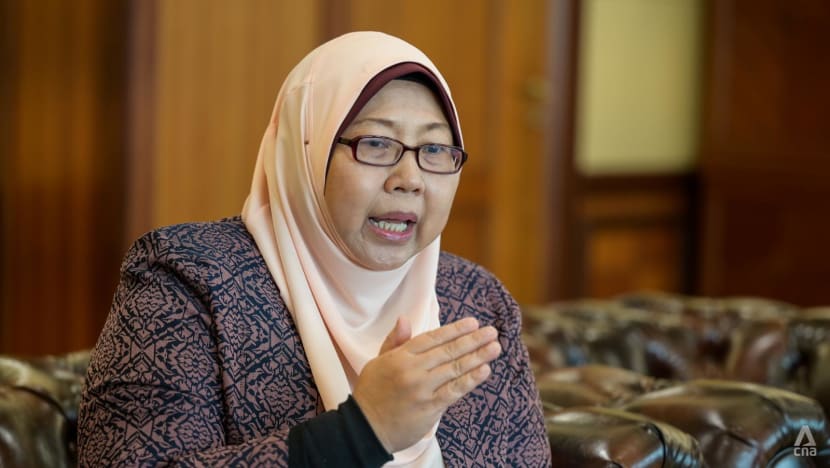
Ultimately, Mdm Fuziah said that consumers must also empower themselves instead of placing the responsibility on the government for everything.
“They can decide on supply and demand in actual fact. And we at the ministry would like them to be game changers rather than pushing it to the government and control everything.
“Sometimes, we hear (that) the government must control this and control that but in a free-market economy you have to understand that it is impossible to control everything,” she said.
She cited the example of regular eggs where the cost of production is more than the ceiling price determined by the government.
“Nobody would like to produce eggs … In a free market economy, we cannot allow this to happen because we have to think of the industry and the public. That is why educating the consumer is important and a priority in the ministry,” she said.
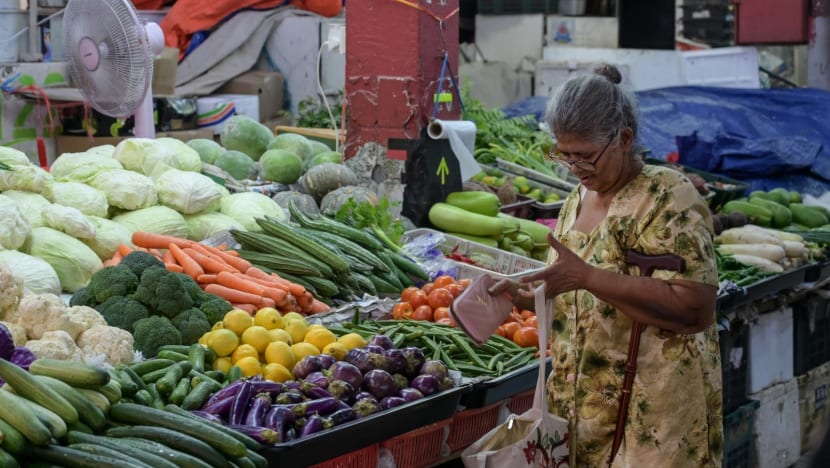
Mdm Fuziah said that price controls were needed at certain times such as festive seasons, although this also caused problems when it came to essential items such as sugar.
She admitted that there was a shortage of sugar in the market currently as the cost of production exceeded the retail price.
“With every kg of sugar that is sold at RM2.85, the producers are losing 88 sen,” she said, adding that the two main producers of sugar in the country have asked for the price of sugar to be raised since 2021.
Mdm Fuziah added that the time for the shift in policy was ripe, as evident by the low inflation rates Malaysia has seen recently.
In September, Malaysia’s headline inflation hit a more than two-year low after the consumer price index (CPI) unexpectedly eased to 1.9 per cent year-on-year (y-o-y) from 2 per cent y-o-y in August. The September CPI reading was the lowest Malaysia has seen since March 2021.
SUBSIDIES MASK TRUE INFLATIONARY PRESSURES
Founder and managing director of one of the big grocery players in the country Mydin Hypermarket - Ameer Ali Mydin - told CNA that while the CPI numbers indicate that inflation is low, he said this is because the basket of goods included in the data includes products that are subsidised by the government like cooking oil, rice and petrol.
He said that the numbers, however, mask the true inflationary numbers of goods, and this is evident in non-subsidised items which he says prices have gone up between 3-5 per cent.
“For the last three to six months, prices have actually gone up and our suppliers say that by January, prices of goods are set to go up by another three to five per cent,” said Mr Ameer.
Moreover, economist Dr Yeah Kim Leng of Sunway University in Malaysia said that overall food price levels still haven’t recovered from supply and global shocks arising from the global commodities particularly, and even though inflation has slowed, it remains at a high base level.
He pointed out that while the CPI dipped to 1.9 per cent in September, that for food and non-alcoholic beverages were at 3.9 per cent in the same month.
“Of concern is food inflation that continues to be persistently high, which is close to double of overall inflation,” he told CNA.
“The price pressures continue to ease but for food, it is easing at a slower pace compared to other consumer items such as transport and communications,” he added.
Dr Yeah said that among the factors contributing to higher food prices are bad weather, shortage of workers in sectors linked to food production, and the depreciating ringgit.
“All these have created uncertainties in the food sector, especially certainty of supply,” he said.
Mdm Nur Atikah Abu Bakar, a market food stall holder in Petaling Jaya, Selangor told CNA that anecdotally on the ground, it has not felt like the price of items like cooking oil, rice, and eggs have stabilised.

The 27-year-old, who sells a variety of fried rice and fried noodles among other things, with prices ranging from RM6 to RM8 per plate, said that she has been forced to raise prices by RM1 since last month.
“Some customers have complained because there is no increase in their income but like it or not, we have to eat everyday. They might complain at first but once their palates agree with the taste, they will keep on repeating,” she said.
Amid the persistently high inflation, businesses have maintained that the shift away from blanket subsidies could hurt their earnings and long term viability.
Mr Tan Ah Hui, who sells fresh chicken at a morning market in Taman Pelangi, Johor Bahru, told CNA that the government’s move to phase out the subsidies and also the price ceiling for chicken on Nov 1 have spiked prices among small stall holders.
He said that some of his competitors were now selling chicken at RM13 per kg, almost 50 per cent more than the price ceiling set by the government previously.
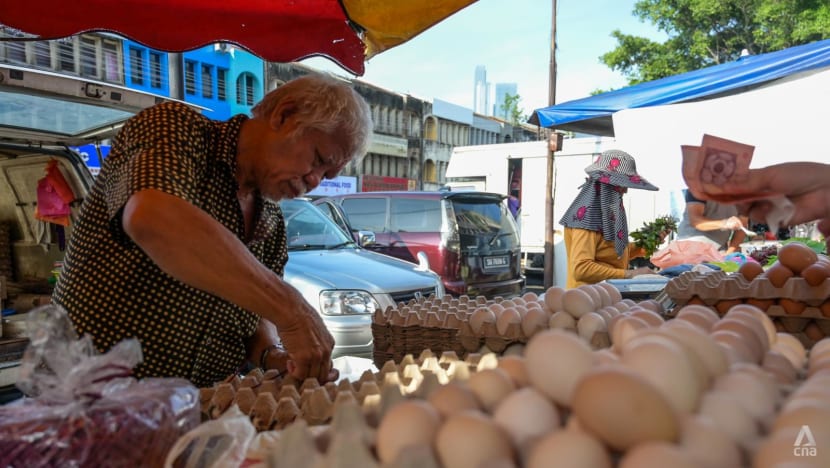
Mr Tan said he has been “compelled to follow suit” but has opted to increase his price by “just 10 per cent”.
“The sad thing is that many of our customers will just buy, because they need to consume chicken. I try to keep my prices steady but we have to follow the market,” he added.
Ms Jenny Lim, who shops at Taman Pelangi market, told CNA that the spike in the prices of chicken have caused her to look at other protein alternatives.
“Instead of chicken I will now buy eggs, or tofu. It’s not the same but sometimes we just cannot afford the increase in prices,” she added.
A big firm who has suffered losses already due to subsidies being phased out is Farm Fresh, a local fresh milk company which is listed on Bursa Malaysia.
Its founder and managing director Loi Tuan Ee told CNA that removal of government subsidies for electricity tariffs has incurred the company “a few hundred ringgit incremental costs a month”.
He said that removal of subsidies, combined with increased labour costs due to minimum wage law increasing the national minimum wage in May 2022 by 25 per cent from RM1,200 to RM1,500, as well as the depreciating value of the ringgit, has hurt his bottom line.
“Costs have increased across the board, I think if you look at everything it could be about 20-30 per cent and this is quite serious,” said Mr Loi.
“Our gross profit margin used to be like 30 per cent but now it is compressed down to about 22-24 per cent,” he added.
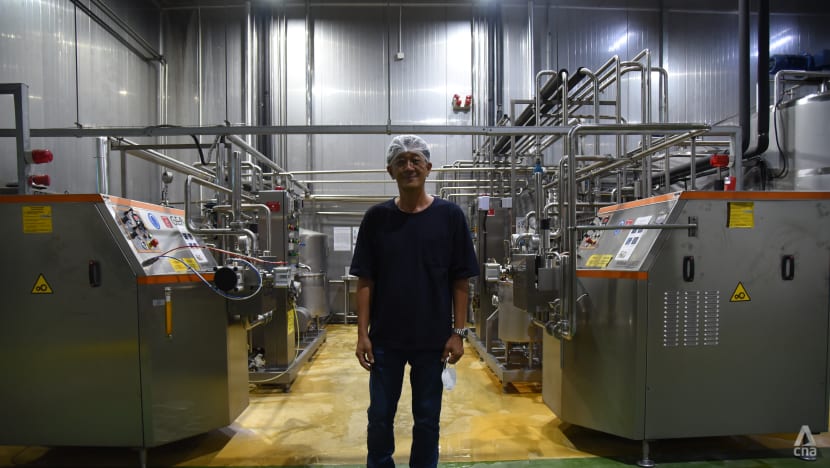
Mr Loi said that Farm Fresh has done its best to absorb the rise in costs but has had no choice but to increase the prices of its products by around 10-12 per cent to remain viable.
“This is an incremental cost to us which will not be reversed anymore. It’s not like costs of concrete or freight which fluctuate up and down or the value of the ringgit - these are the moving parts. Removal of subsidies is a permanent added cost to us,” said Mr Loi.
Furthermore, Malaysia’s budget meal scheme Menu Rahmah, has also fizzled out in recent months.
The scheme, which was spearheaded by the late Minister for Domestic Trade and Cost of Living Salahuddin Ayub, is a voluntary initiative for food eateries to offer meals for RM5 meant for the lower income population.
While the concept was initially warmly welcomed by many industry players, many have ceased offering this due to business concerns and rising prices of ingredients.
Last month, director for Hameediyah Restaurant, a famous nasi kandar eatery with outlets across Penang and the Klang Valley, told local media that the company has stopped offering RM5 meals as the cost of ingredients were “unbearable”.
“We could not implement it any longer. First, the price of chicken went up and then, eggs.
“We still maintained the price (of the dish) but then, the price of rice and sugar also,” he reportedly said.
CNA did checks across some highway eatery rest stops operated by PLUS and found that most of the stores no longer offered Menu Rahmah meals.

Mydin hypermarket’s Mr Ameer told CNA that the firm is still offering Menu Rahmah and he is “very disappointed” that some operators have ceased doing so.
“Having a big heart is very important. (Menu Rahmah) is only 11 per cent of your total business. If it is 70 per cent of your business, that nobody can sustain.
“Community service is very important. We as corporate citizens earning money from the rakyat (people) cannot only be thinking of profiteering. We must think about how much we can give back to the society that you make money from,” added Mr Ameer.
WEAK RINGGIT'S KNOCK-ON EFFECT ON FOOD PRICES
In addition to the removal of subsidies, many food businesses across the country have also been hit by the poor performance of the ringgit.
Economists said that the ringgit is the worst-performing currency in the region in 2023, falling more than 5 per cent against the US dollar and reaching an all-time low against the Singapore dollar of 3.5086 in October.
According to Bloomberg data, the ringgit has been hovering at 25-year lows in recent weeks, hitting 4.8 against the greenback in October, close to when it hit the historic low of 4.885 during the 1998 Asian financial crisis. The ringgit has since recovered to around 4.7 per US dollar.
The latest slump has triggered concerns among Malaysians in the food industry, many of whom have experienced knock on effects and have been forced to spend more on their imported raw materials and products.
It has been reported that Malaysia imports about 60 per cent of its food, with food imports totalling about RM75.71 billion in 2022.
Mdm Selena Koh, who sells onions at Johor’s Larkin market, told CNA that due to the depreciating ringgit, a bag of onion imported from Indonesia which previously cost RM90 is now priced at more than RM120.
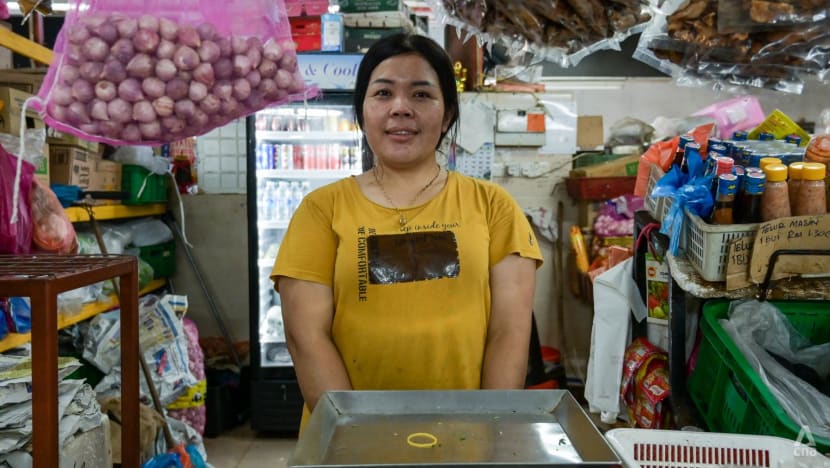
“We have to pass on some of these costs. Customers still come but it's apparent that they buy less quantity,” she added.
The poultry seller Mr Hasri said the depreciating ringgit against the US dollar meant that items like plastic packaging, gloves, chicken feed have gone up as well.
“It adds up quite quickly. Our expenses have increased 20 per cent since July,” he said.
Mydin hypermarket’s chief Ameer outlined that the food industry is heavily impacted by the depreciating value of the ringgit, especially against the US dollar, because it “imports almost everything under the sun”.
“We import flour, potatoes, sugar, almost everything. So there’s definitely what we call import inflation due to the depreciating ringgit,” he added.
Farm Fresh’s Mr Loi echoed similar sentiments, pointing out how his firm has been hit by a double whammy of increasing material costs such as whole milk powder, corn grain as well as cardboard packaging for his milk products, alongside the additional costs due to currency depreciation.
“Increase in material cost due to the Ukraine war etc is one problem. And then the currency has depreciated further. So this has really, really hurt us,” he added.
While inflation due to global supply chains has shown signs of ebbing, the cost of living issues in Malaysia is not going away anytime soon.
POLITICAL COSTS IN SHIFT FROM POPULIST POLICIES
Malaysians who spoke to CNA have also warned that if the issue is not addressed, they will not hesitate to express their dissatisfaction at the ballot boxes in subsequent polls.
Pensioner Zulkifli Abu Bakar, 57 who resides in Selangor, told CNA that the government must do more to help the lower income population in Malaysia, especially the B-40 (bottom 40 per cent) to cope with the increase in prices of goods such as rice, eggs, and chicken.

He said that subsidised cooking oil and sugar are difficult to get at times, with some stores limiting the number of packs of these items that can be purchased.
“It is difficult for retirees like us and those of the lower income groups because our income is not high. When the cost of living is high, social issues such as theft, suicide and crimes will also increase. The government has to pay serious attention to this and not just talk in parliament.
“Maybe those who are not working will have to start working again. Every day, the cost of living is going up,” he said.
Johor fishmonger Azmi Abu Bakar told CNA that he fears that without price controls, the market will be more uncertain. His business expenditure has also gone up with the depreciating ringgit, as ice, styrofoam boxes and packaging costs more.

“If prices (of basic food items) continue increasing on this trajectory, it will not be good for the Madani government. Food prices are quite a basic issue and if PM Anwar can’t solve it, I fear for him,” he added.
Malaysia Madani, or Civil Malaysia is Prime Minister Anwar's slogan for his unity government and it encompasses concepts like the compassionate umbrella programme to mitigate the cost-of-living crisis.
On the other hand, business owners Farm Fresh’s Mr Looi and Mydin Hypermarket’s Mr Ameer told CNA that they support the government’s decision to revoke subsidies, as they feel that leaving it to the free market is better for the long term.
Economist Dr Yeah echoed similar sentiments, stating that the government is making the right move in not interfering in the efficient functioning of the market.
“Let the supply and demand work out the imbalances and as long as the fluctuations are not overly sharp, the government shouldn’t intervene,” he said.
He said that once markets normalise, subsidies should be removed and that failure to do so could result in imbalances between supply and demand.
Deputy Minister Fuziah added that the government cannot take a populist stance and must make the correct decisions for the country.
“The government has to do what is right for the people…They may not be populist decisions; however they are necessary decisions,” she said.
She said there was a need to look into raising the income of the public and civil service.
“It’s a multifaceted strategy that we must look at in many different ways. Malaysia has a fair share of these issues, but I think other countries are worse than us,” she said.
The government said that these decisions are akin to short term pain for long term gain, but many Malaysians on the ground are sceptical that they will bear fruit.
Mr Hasri, the poultry seller in Larkin, told CNA that food inflation is an issue that is “close to the hearts of many Malaysians” and is concerned why the government is choosing to withdraw subsidies at this juncture.
“This week, the Madani government is one year old. They keep saying they need more time to see the impact of their policies, but they have not done enough so far,” said Mr Hasri, as he packs some chicken into a freezer box before he closes up for the day. Business has been slow yet again, he added.
“If they want to win another term, they must resolve this quickly.”









